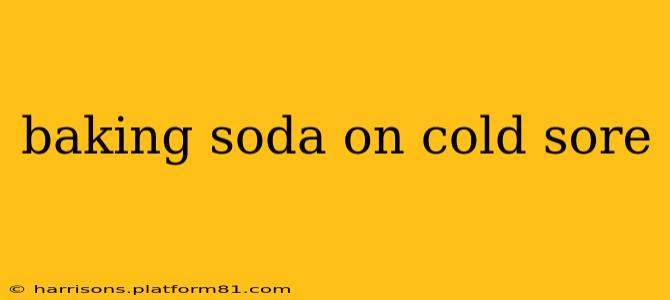Cold sores, those pesky blisters caused by the herpes simplex virus (HSV-1), are a common nuisance. While there's no cure, many seek home remedies to ease the discomfort and speed up healing. Baking soda is one such remedy, often touted for its ability to dry out the sore and reduce inflammation. But does it actually work, and is it safe? Let's explore.
Does Baking Soda Help Cold Sores?
The purported benefits of baking soda on cold sores stem from its alkaline nature. The theory is that the alkaline environment created by baking soda inhibits the growth of the virus and dries out the blister, potentially speeding up the healing process. However, scientific evidence supporting these claims is limited. While some people report relief from using a baking soda paste, there are no large-scale clinical trials confirming its effectiveness.
How to Use Baking Soda for Cold Sores (If You Choose To)
If you decide to try this home remedy, it's crucial to do so carefully. Never apply baking soda directly to the cold sore; its abrasive nature can irritate the already sensitive skin. Instead, create a paste:
- Mix: Combine a small amount of baking soda with just enough water to form a smooth paste.
- Apply: Gently dab a tiny amount of the paste onto the cold sore using a clean cotton swab or finger.
- Wait: Allow the paste to sit for a few minutes before gently rinsing it off with cool water.
- Repeat: You can repeat this process a couple of times a day, but monitor your skin for any signs of irritation.
Important Note: This method is not a substitute for medical advice. Always consult a doctor or dermatologist if you have concerns about a cold sore.
Is Baking Soda Safe for Cold Sores?
While generally considered safe for topical use, baking soda can irritate sensitive skin. If you experience increased burning, stinging, redness, or swelling, discontinue use immediately and consult a healthcare professional. Individuals with sensitive skin are particularly advised to exercise caution. The abrasive nature of baking soda might worsen the sore instead of helping it.
What are Other Home Remedies for Cold Sores?
Many people find relief from cold sore symptoms using other home remedies. These include:
- Ice: Applying ice can reduce swelling and pain.
- Lysine: Some studies suggest that lysine, an amino acid, might help prevent or reduce the severity of cold sores.
- Tea bags: The tannins in tea bags have astringent properties that can help dry out the sore.
- Over-the-counter creams: Numerous topical creams and ointments are available to alleviate cold sore symptoms.
Remember, these are just home remedies, and their effectiveness varies from person to person.
Can I use baking soda on cold sores that are cracked or bleeding?
No, you should absolutely avoid using baking soda on cold sores that are cracked or bleeding. The abrasive nature of baking soda will further irritate the already damaged skin and could potentially delay healing. Stick to gentle cleansing with cool water and consider contacting a doctor for advice on managing the more severe cold sore.
Does baking soda prevent cold sores?
There is no scientific evidence to suggest that baking soda prevents cold sores. While it might offer some minor symptomatic relief, it does not address the underlying viral infection. The best way to potentially reduce the frequency and severity of cold sores is to maintain a strong immune system and practice good hygiene, including avoiding touching or sharing items that may be contaminated with the virus.
When Should I See a Doctor About a Cold Sore?
While most cold sores heal on their own within a week or two, consult a doctor if:
- Your cold sores are severe or unusually painful.
- They last longer than two weeks.
- You experience symptoms beyond the typical cold sore, such as fever, swollen lymph nodes, or eye involvement.
- You have a weakened immune system.
This information is for general knowledge and informational purposes only, and does not constitute medical advice. Always consult with a qualified healthcare professional for any health concerns or before making any decisions related to your health or treatment.
